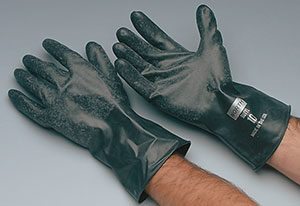
It is important to use the right safety gloves for the right task. Different tasks can require different types of gloves. When it comes to the choice of work gloves, it is important that you choose the one that fits you easily, does not provide any discomfort and helps you do your job while protecting your hands from the materials that may harm your skin.
Types Of Safety Gloves Based On the Material
Safety gloves can be of these types based on the material:
- Canvas (fiber and other synthetic materials): This type of work glove is ideal for protection from moderate heat and cold. Moreover, it provides resistance to abrasions.
- Leather: This material is used to provide protection in the areas where there is exposure to rough objects, chips, blows, sparks, and moderate heat.
- Metal mesh (aluminized): This glove requires an insert of a synthetic material to protect the skin. It is ideal for use in areas where a worker has to handle heat.
Categories of Work Gloves Based on the Liquids they Resist
In many work applications, like chemical industries, there is a need for adequate protection from toxic liquids. Safety gloves allow the workers to work safely without contaminating the workspace or hurting their hands. Different chemicals can be protected by different materials. Here is a breakdown of the gloves used in industries where exposure to liquids is usual.
1. Butyl Rubber
Butyl rubber is able to resist these chemicals: acids, bases, alcohols, aldehydes, esters, peroxide, ketones, nitro-compounds and rocket fuels. Gloves made of this material are useful in protecting against:
- Abrasion
- Cold
- Oxidation
- Ozone Corrosion
2. Natural Latex Rubber
Natural latex rubber is able to resist these chemicals: alkalis, diluted acids, ketones and salts. Gloves manufactured from this material have good elasticity and tensile strength. However, prolonged use can cause allergic reactions. Latex gloves can resist:
- High temperature
- Abrasions caused by grinding, polishing and sandblasting
Great Selection of Gloves from Safety Gear Pro
Hand protection is an essential part of safety. From the job site to the lab, to your office or to your home we all use our hands for different activities but still need to perform our tasks while keeping our hands safe. Take a look at our catalog of gloves & hand protection.
3. Neoprene
Neoprene is the ideal material to provide protection against alcohols, alkalis, organic acids, gasoline and hydraulic fluids. These gloves have high density and provide a better finger dexterity and pliability than most gloves. They are resistant to:
- Wear and tear
- Chemicals (resistance better than latex)
4. Nitrile Rubber
In the applications that require the use of acids, alcohols, caustics, chlorinated solvents, oils and greases, nitrile rubber gloves are the best option. They provide both sensitivity and dexterity of use, and are highly durable.
Safety Gloves Types and Uses FAQs
How do I choose the right type of gloves for me?
There are numerous types of gloves available that are constructed from various materials. Glove materials include metal mesh, canvas, leather, butyl rubber, neoprene, nitrile and latex rubber. The right type for you will depend on the activity being performed and the hazards present. For example, an employee working in a chemical laboratory will require a different type of gloves than a worker who is exposed to potential cuts and abrasions on a construction site. Therefore, it is important to assess your own work and the hazards you may encounter and choose the gloves that will provide the best protection for you. When in doubt, turn to the experts at Safety Gear Pro to help you select the right gloves for your unique situation.
What are the benefits of safety gloves?
Safety gloves are designed to protect a worker’s hands from hazards so that they can perform their job safely. Gloves come in many different materials that offer protection against specific dangers. Depending on the job, a worker may face risks including chemicals, cuts, punctures, abrasions, electrical hazards and thermal hazards. Examples of glove materials include canvas and leather, which can shield the skin from cuts, scrapes and abrasions. Other materials such as butyl rubber and nitrile can protect hands from burns and irritation caused by certain types of chemicals. Regardless of the work you perform, there is a type of glove that can help keep your hands safe.
Which types of gloves are chemical-resistant?
There are several types of chemical-resistant hand gloves available, but not all are appropriate for every type of chemical. Nitrile gloves can protect from a range of chemicals, including acids, bases and solvents. Neoprene gloves are best for use with products such as alcohol and gasoline. Another option is latex rubber gloves, which protect hands from ketones and other similar substances. Butyl rubber gloves can shield against several types of chemicals as well as provide protection from thermal and abrasive hazards. It is important to ensure that the gloves you select are compatible with the chemicals that you use, so be sure to check glove descriptions before ordering.
Related Articles
- Leather Work Gloves – How to Choose the Right Ones?
- What makes Nitrile Gloves a Preferable Choice
- All You Need to Know About Choosing the Right Leather Work Gloves
- Choose the Right General Purpose Gloves to Keep Your Hands Away from Harm
- The Unconventional Uses of Utility Gloves
Related Categories


































